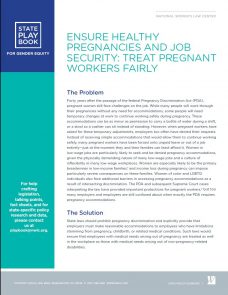Abortion rights, women of color, and LGBTQI+ people are under attack. Pledge to join us in fighting for gender justice.
 Forty years after the passage of the federal Pregnancy Discrimination Act (PDA), pregnant women still face challenges on the job. While many people will work through their pregnancies without any need for accommodations, some people will need temporary changes at work to continue working safely during pregnancy. These accommodations can be as minor as permission to carry a bottle of water during a shift, or a stool so a cashier can sit instead of standing. However, when pregnant workers have asked for these temporary adjustments, employers too often have denied their requests. Instead of receiving simple accommodations that would allow them to continue working safely, many pregnant workers have been forced onto unpaid leave or out of a job entirely—just at the moment they and their families can least afford it. Women in low-wage jobs are particularly likely to seek and be denied pregnancy accommodations, given the physically demanding nature of many low-wage jobs and a culture of inflexibility in many low-wage workplaces. Women are especially likely to be the primary breadwinner in low-income families,1 and income loss during pregnancy can impose particularly severe consequences on these families. Women of color and LGBTQ individuals also face additional barriers in accessing pregnancy accommodations as a result of intersecting discrimination. The PDA and subsequent Supreme Court cases interpreting the law have provided important protections for pregnant workers,2 but too many employers and employees are still confused about when exactly the PDA requires pregnancy accommodations.
Forty years after the passage of the federal Pregnancy Discrimination Act (PDA), pregnant women still face challenges on the job. While many people will work through their pregnancies without any need for accommodations, some people will need temporary changes at work to continue working safely during pregnancy. These accommodations can be as minor as permission to carry a bottle of water during a shift, or a stool so a cashier can sit instead of standing. However, when pregnant workers have asked for these temporary adjustments, employers too often have denied their requests. Instead of receiving simple accommodations that would allow them to continue working safely, many pregnant workers have been forced onto unpaid leave or out of a job entirely—just at the moment they and their families can least afford it. Women in low-wage jobs are particularly likely to seek and be denied pregnancy accommodations, given the physically demanding nature of many low-wage jobs and a culture of inflexibility in many low-wage workplaces. Women are especially likely to be the primary breadwinner in low-income families,1 and income loss during pregnancy can impose particularly severe consequences on these families. Women of color and LGBTQ individuals also face additional barriers in accessing pregnancy accommodations as a result of intersecting discrimination. The PDA and subsequent Supreme Court cases interpreting the law have provided important protections for pregnant workers,2 but too many employers and employees are still confused about when exactly the PDA requires pregnancy accommodations.

